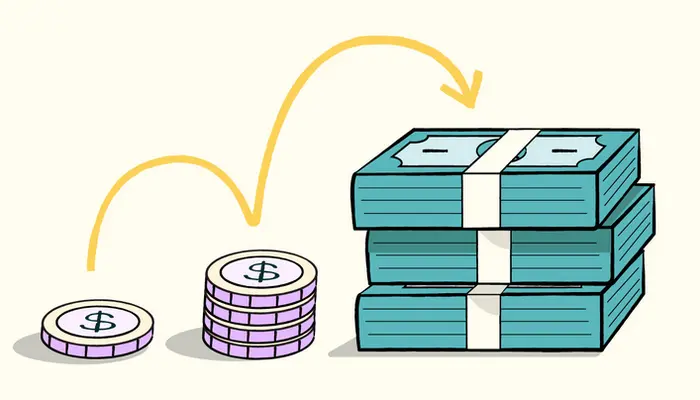How Compound Interest Works: The Secret to Long-Term Wealth
Advertisements
Have you ever heard the phrase “money makes money”? Behind this simple saying lies one of the most powerful concepts in finance: compound interest. Like a snowball rolling downhill, it grows stronger over time, turning small amounts into substantial wealth — all it takes is patience, consistency, and the right knowledge.
Advertisements
Unlike simple interest, which only earns on the initial amount, compound interest allows your earnings to earn more. It’s like putting your money to work, multiplying on its own month after month, year after year — with no extra effort on your part.
In this article, you’ll learn exactly how compound interest works, why time is your greatest ally, and how you can start using this strategy today to build long-term, intelligent wealth. Ready to change the way you think about money?
Advertisements
What Is Compound Interest?
Compound interest is when you earn interest not only on your original investment but also on the interest that your investment has already earned. It’s the concept of money growing on top of money, creating exponential results over time.Unlike simple interest, which remains fixed and predictable, compound interest accelerates the growth of your money the longer it stays invested.

That’s why even small amounts can turn into large sums if given enough time and consistency. Think of it as planting a tree: at first, it grows slowly, but as the roots deepen and branches spread, the growth becomes faster and more noticeable. Compound interest follows the same pattern, rewarding those who start early and stay committed.
It’s not just a financial formula — it’s a mindset. Understanding compound interest means realizing that time and consistency are more valuable than trying to chase quick returns or high risks. It’s wealth built with patience.
The Basic Formula
Future Value = Principal × (1 + Rate)^Time
- Principal: the initial amount you invest
- Rate: the interest rate per compounding period
- Time: the number of compounding periods
Why Time Is Your Best Friend
When it comes to building wealth with compound interest, nothing is more powerful than time. The longer your money stays invested, the more opportunities it has to grow — not just linearly, but exponentially. Time gives your money room to breathe and multiply.
What many people don’t realize is that compound interest rewards early starters far more than big investors who start late. Starting early, even with small amounts, can outperform larger investments made later because of the snowball effect over time.
Time also protects you from emotional mistakes. With a long-term horizon, short-term market fluctuations matter less. You’re not rushing; you’re planting seeds and letting them grow — and over the years, that patience pays off more than any market timing ever could.
Compound vs. Simple Interest
| Type | After 10 Years (10%) | Total Growth |
|---|---|---|
| Simple Interest | $2,000 | 100% |
| Compound Interest | $2,593 | 159% |
Real-Life Example
Let’s say you invest $200 every month in a portfolio with 8% annual return.
- After 10 years: ~$36,000 (you invested $24,000)
- After 20 years: ~$109,000 (you invested $48,000)
- After 30 years: ~$270,000 (you invested $72,000)
That’s over $198,000 earned through compound interest alone.
Where to Start Investing
If you’re just starting out, the idea of investing can seem overwhelming — but it doesn’t have to be. The key is to begin with options that are simple, accessible, and low-risk. That way, you build confidence while your money begins to grow.
A great starting point is index funds or ETFs. They offer diversification, meaning your money is spread across many companies, reducing risk. Plus, they often come with low fees and require no advanced knowledge to get started.
For long-term goals like retirement, consider opening a Roth IRA or contributing to a 401(k). These accounts offer tax advantages, which can significantly increase your returns over time — a silent ally of compound interest.
If you prefer to start small, even a high-yield savings account or a digital investment app can get you going. The important thing isn’t choosing the perfect asset — it’s getting into the habit of investing consistently.
Habits That Supercharge Compound Interest
Compound interest works best when paired with the right behaviors. While the math is powerful on its own, your habits are what truly unlock its full potential over time. The earlier and more consistently you act, the stronger the results.
Building wealth isn’t about luck — it’s about strategy and discipline. Successful investors don’t wait for the perfect moment; they create momentum by showing up every month, rain or shine. These small, repeated actions build financial muscle.
If you make these habits part of your routine, compound interest will take care of the rest. The process is slow at first, but it grows faster and stronger the longer you stick with it.
Powerful habits to boost compound growth:
- Invest a fixed amount every month — no matter what
- Reinvest all your earnings (don’t withdraw early)
- Set your investments to run on autopilot
- Avoid emotional decisions during market drops
- Focus on the long term, not quick wins
- Choose low-cost, diversified investments
Common Pitfalls to Avoid
While compound interest is powerful, it’s not magic — and many people unknowingly sabotage their results by falling into avoidable traps. Knowing what not to do is just as important as knowing what to do.
The most common mistake is giving up too early. Because the growth curve starts slowly, some people get impatient and pull out their money before the real gains begin. Others try to time the market, chasing trends and forgetting the power of consistency.
Being aware of these missteps helps you stay focused on the long-term goal. Avoiding these pitfalls won’t just save your investments — it will protect your mindset and financial confidence along the way.
Common pitfalls to watch out for:
- Stopping investments during economic downturns
- Withdrawing earnings too early
- Trying to “time” the market with risky moves
- Ignoring fees and taxes that erode returns
- Constantly changing strategies with every market shift
- Investing without a clear goal or plan
Psychology of Long-Term Wealth
Building long-term wealth is more about mindset than money. It requires patience, discipline, and the ability to delay gratification — traits that go against our natural desire for quick results. That’s why so few people stick with it, even when the path is clear.
The psychology behind wealth creation involves resisting short-term distractions. Market drops, viral trends, and fear of missing out (FOMO) often lead to impulsive decisions. Wealthy people learn to stay calm, focused, and committed, even when things look uncertain.
Real financial success isn’t about making one big move. It’s about repeating the right behaviors over and over. The greatest returns come not from timing the market, but from time in the market — with a mindset built for the long run.
Quick Checklist to Start Today
- [ ] Open an investment account (Roth IRA, brokerage, etc.)
- [ ] Set up automatic monthly contributions
- [ ] Choose a diversified portfolio or index fund
- [ ] Reinvest all earnings
- [ ] Monitor annually, don’t micromanage
Take Action Now
There’s no need to wait for the “perfect” moment to start investing — it may never come. The best time to take control of your financial future is now. Even small, consistent steps can lead to extraordinary results over time.
Whether you’re starting with $10 or $1,000, what matters most is creating the habit. Automate your contributions, choose a diversified investment, and stick with it. Compound interest rewards those who show up consistently, not those who try to guess the market.
Compound interest is more than a formula — it’s a long-term mindset. When you respect time, stay disciplined, and make smart financial choices, you build a future that works for you — not against you.
So, take this knowledge and turn it into action. Don’t just admire the power of compound growth — use it. Start today, and your future self will thank you.





